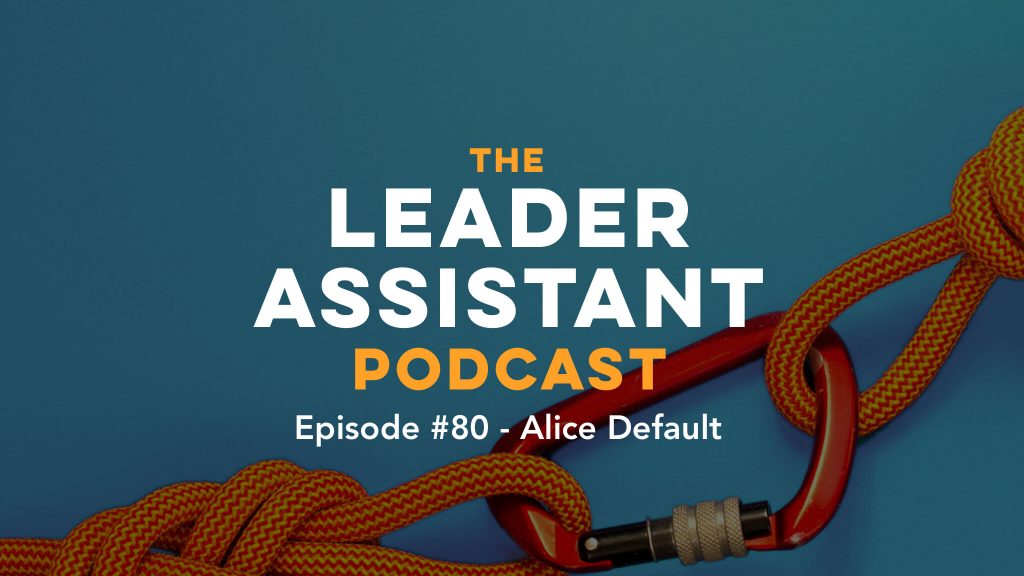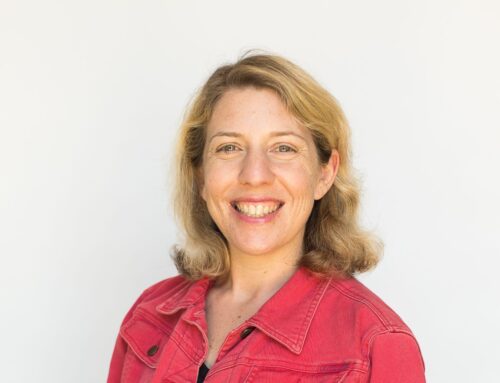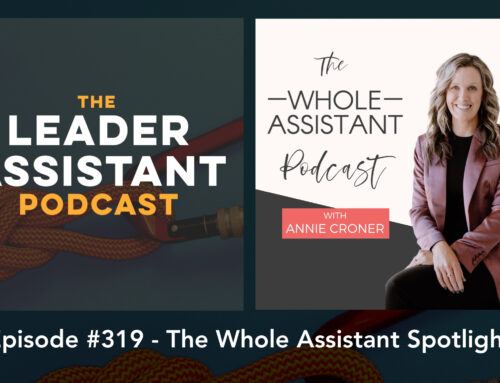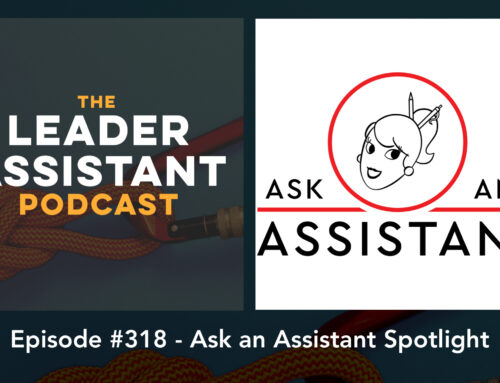Alice Default has spent over 6 years building productivity tools to help people work better at companies including Microsoft, Sunrise, and Front.

Since 2018, Alice and her team have been laser-focused on helping CEOs and their teams get more done with Double, a modern executive assistant service that sources experienced US-based assistants and empowers them with great tech.
In this episode, Alice talks about what her executive clients look for in an assistant, what assistants do that will never be replaced by tech, and shares what it’s like to run her own company, raise capital, and more.
Learn more about Double at withdouble.com.
HIMALAYA LEARNING AUDIO COURSE
Check out my new audio course available exclusively on Himalaya Learning to learn 7 practical keys you can use to reclaim your time, energy, and productivity in a world filled with distractions, interruptions, and burnout.
Himalaya Learning is an audio learning platform that provides an extensive library of courses straight to your ears from the world’s greatest minds like Malcolm Gladwell, Tim Ferriss, Seth Godin, Linda Hill and more.
To access my course and others like it, go to himalaya.com/keys and enter promo code KEYS for your free 14-day trial.
LEADER ASSISTANT MEMBERSHIP
Check out the Leader Assistant Membership for ongoing training, coaching, and community.
LEADERSHIP QUOTE
We take care of the people, the products and the profits…in that order.
– Jim Barksdale
CONNECT WITH ALICE AND DOUBLE
ABOUT ALICE
Alice Default has spent over 6 years building productivity tools to help people work better at companies including Microsoft, Sunrise, and Front.
Since 2018, she and her team have been laser-focused on helping CEOs and their teams get more done with Double, a modern executive assistant service that sources experienced US-based assistants and empowers them with great tech. Doubles are incredibly talented at handling your calendar, inbox, travel, admin, and anything else on your to-do list and the company is already helping hundreds of executives nationwide.
Alice is Forbes 30 Under 30 and has just completed a $6 million raise for Double led by angel investing powerhouses Index Ventures and Daphni Ventures.
THE LEADER ASSISTANT BOOK
Download the first 3 chapters of The Leader Assistant: Four Pillars of Game-Changing Assistant for FREE here or buy on Amazon here.
JOIN THE COMMUNITY
Join the Leader Assistant Slack Community here, or the Facebook Group here for bonus content and to network with other assistants who are committed to becoming leaders!
SUBSCRIBE
Subscribe to The Leader Assistant Podcast so you don’t miss new episodes!
You can find the show on Apple Podcasts, Spotify, Google Podcasts, Pandora, and Stitcher.
Join my email list here if you want to get an email when a new episode goes live.
LEAVE A REVIEW
If you’re enjoying the podcast, please take 2 minutes to rate and review the show on Apple Podcasts here. Each review helps me stay motivated to keep the show going!
—
EPISODE TRANSCRIPT
Alice Default 0:00
Hi, I’m Alice Default. Today’s leadership quote comes from James Barksdale, we take care of the people, the products and the profits in that order.
Podcast Intro 0:10
The Leader Assistant Podcast exists to encourage and challenge assistants to become confident game changing leader assistants. Thank you so much for listening. Oh, I’m old. Here’s your host, my dad.
Jeremy Burrows 0:28
Hey, friends. Thanks for tuning in. Before we jump into today’s episode, I wanted to let you know about my new audio course in partnership with Himalaya learning. It’s called seven keys to reclaiming your time, energy and productivity. And it’s available exclusively on Himalaya learning. Himalaya learning is an audio learning platform that provides bite sized courses from world class thinkers and industry experts to fuel your personal and professional growth. To access my course and others like it, go to himalaya.com/keys and enter the promo code K e y s for your free 14 day trial again himalaya.com/keys Enter the promo code keys for your 14 day free trial. I hope you enjoy it. And now let’s jump into Episode 80. You can check out the show notes at leaderassistant.com/80. Hey, everyone. Thanks for tuning in to The Leader Assistant Podcast at your host Jeremy Burrows. And today I’m speaking with Alice Default. Alice is the CEO and co founder of Double Alice, how’s it going?
Alice Default 1:41
It’s going great. Thank you so much for having me, Jeremy.
Jeremy Burrows 1:44
Yeah, I’m excited to chat. What part of the world are you in?
Alice Default 1:47
I’m currently in New York City.
Jeremy Burrows 1:49
Awesome. So tell us a little bit about double. First of all, what is double?
Alice Default 1:56
Sure. So double is a remote assistance service for busy executives. Basically, what we do is that we offer CEOs and executive to be matched with a dedicated human assistant based in the same country as them. And then we empower both sides with really great tools to get the work done.
Jeremy Burrows 2:15
Awesome. And how long have you been? Double?
Alice Default 2:19
We’ve been? We’ve been around for about two years. We were in beta for our first two years and worked with about 100 companies. And we’ve just recently come out of self.
Jeremy Burrows 2:32
Awesome. So before I get too much into kind of double in the software and search, let’s talk a little bit about you. What was your very first job? And what skills did you learn in that role that you still use today while you’re running a company,
Alice Default 2:47
my first very first job was actually babysitting. So I’m guessing a classic for a lot of people out there. What it taught me that I still use today. I would say patience, that’s for sure. But I also think that babysitting and working with kids teaches you how to communicate with people who don’t communicate the same way you do, I would say and like learning to adapt to someone’s someone else’s communication style, which I think as a as a leader or executive or someone who manages a team is always like something super important to do of not being stuck in how you digest information and how you want to learn things, but really being mindful of the other person and how to communicate with them.
Jeremy Burrows 3:39
Nice. So tell us a little bit about your career trajectory, and kind of what brought you along to eventually run your own company.
Alice Default 3:52
So I’m from I’m from France originally. So I went to business school there and didn’t really know what I wanted to do. after business school, all my friends were going into consulting or finance jobs or working for big corporations. And I just didn’t really know what I wanted to do with my life. And by chance, I met someone who was working at a startup and it felt like you didn’t really have to have a clear job when you were working for a startup. And that’s really how I got into that at first was just, you know, when you’re early stage and a company you can basically define your own role based on what you want to do. And that’s initially what attracted me to tech startups and and once I tried it, I fell in love with it and didn’t want to go back. So I worked for a couple of startups every time as their first non tech, technical hire. So pretty much doing everything else from marketing to customer service to user research to business bizdev so a lot of different things, which was obviously super exciting. And then the company I was working out at which was called Sunrise Calendar, which was building a calendar app got acquired by Microsoft. And so out of the blue, it was a very, we jumped into a very, very different environment. Super large company, obviously building a product that had massive scale we went we were brought into we build Outlook mobile apps. And that really pushed us to discover an entire new way of, of doing things, still thinking a lot about productivity, which was something that I had been doing for a few years and how people work and how they spend their time. And after a few years at Microsoft, my co founders and I, we were already working together, we had been working together at that previous company, as well knew that we wanted to go forward into helping people be more productive. And we wanted to do it in a way that didn’t only rely on better tools, we were we had been building productivity tools for almost five years back then, and understood the limitation of only relying on productivity tools, once you reach a certain level. And started to think a lot about assistance and talking to people who had assistance and assistance themselves and realizing that there was this massive opportunity to bring the experience of having a really, really great assistant to a lot more people and do it in a way that was modern and flexible. And just adapted to how executives work today. And so we left Microsoft about two years ago to start double with with this idea in mind.
Jeremy Burrows 6:35
That’s great. So what was tell us a little bit more about that transition from working at sunrise, and then, you know, getting acquired by Microsoft. You know, that’s, that’s a pretty dramatic move. And I know there are a lot of lot of executive assistants that are either working in a large corporation like Amazon, or Facebook or Microsoft, and then, you know, exploring opportunities at startups. And then there are other EAS I know of that are kind of in the startup world and have been in the startup world. And wondering if those big large corporations are something for them to try out. So any any insight on kind of the difference between the two or how that experience went?
Alice Default 7:22
Definitely, I think both are really, really interesting. And it really depends on your personality on which one is going to be a better fit for you. There’s really no not one that’s better, or that’s going to offer, that’s going to be more interesting. What I found from my experience was that the startup world is maybe more open to you defining your role and being proactive. And really, you know, that zero to run, right setting things up for the first time. And so getting to decide how to do things, how to implement new processes. And what you’re doing in a startup world is really setting the foundations of what’s going to come next. And so it’s exciting in a new way, because you get to decide on so many new things that haven’t been done before. But it’s also scary, because it hasn’t been done before, right. And so there’s also a lot of testing and failing, and not always knowing what to do, because it’s also new. And so there is definitely bad and good there. On the other side, really big corporations like Microsoft or like even smaller companies. But it’s more about having something that works and making sure that it keeps working. And so you are going to be improving processes and implementing new ideas, but you’re doing it in a space that’s a lot safer, that probably will support you in a better way I would say and where you have more people to, to rely on. And so it really depends on what gets you excited every day and what you want to, you know, push on your side, whether it’s a lot of creativity and a lot of iterating and failing and new beginnings or setting foundations for something or taking something that works and just you know, bringing it to the next level in a space that’s a bit safer.
Jeremy Burrows 9:16
Wow. Yeah, that’s a great way to put it. Thank you for sharing. What is your favorite part about running? Double?
Alice Default 9:30
I think to me, it’s building the team and building the team obviously. The first thing is finding great people and just you know, having people who are so convinced in what you’re doing that they want to come work for you is an amazing feeling. Because it validates what you’re building and it’s always great to have people who believe in the same vision as you. But I also what I love about building a team and doing it with really great people is that once you set up everyone for success, things kind of run without you and that’s sad. triggered feeling for me of, you know, having having build processes or like, you know, things that that we need to do or setting goals. And then just stuff happens, right, because I have a great team who handles everything. And I don’t have to be in every meeting anymore. And I don’t have to be looking at every detail, because I trust the people who work with me. And kind of seeing just a company move forward based on the goals that we’ve set ourselves without me directly working on them is such a great feeling.
Jeremy Burrows 10:32
Yeah. So what about your least favorite part?
Alice Default 10:38
That’s tough. It always changes, depending on my mood. I think what’s hard on the long run is just kind of the, you know, most people say that starting company isn’t a sprint, it’s a marathon. And I totally agree with that. I really feel it. And I think what’s hard with that, it’s that it’s just, you know, you’re here for the long run. And so whatever you’re doing now, or whatever is hard now is going to stay hard most of the time. Or if the thing that you’re working on is getting easier than something else is going to become hard. And so it’s this fact that it’s just like, you never really get to rest because as soon as you get comfortable in a new situation, or with a new problem, then something else comes up, right. So I think it’s, that’s, that’s the part that’s, you know, you can never sit down and be like, Okay, we’re good right now, like, everything’s checked, we’re in a good spot. Like it’s always always moving. And it’s all you’re always doubting yourself on the next step forward. In and once you’re doing that, and it’s on the long term, right, you’re in this marathon, then it gets tiring, I would say, on the long run, and then you don’t make as good decisions anymore. And so you kind of like go back into this circle of doubting yourself again. So I think it’s tough, just keeping the the mental energy. To do this, to do this well, every single day and finding time to rest and to take a step back. Is it’s hard.
Jeremy Burrows 12:07
For what do you personally do to kind of make sure you take time to rest and refresh?
Alice Default 12:16
First thing is, I have a great assistant who tells me not to go to disconnect. And she’s great. She’s, like, booked time in my calendar so that I don’t, I don’t I just step out of the office for a bit. Fun thing that is very draining for me is email, which is like managing my inbox, it has always been super draining because I was like, just people sending you problems. And Matthew, my, my double just helps me so much with that. And that’s really, for my mental energy been super, super well. And then I try to disconnect law, like on weekends at night, when I’m off, I’m really off, I turn off my notifications, I blocked my emails. And that’s, that, for me is like necessary just to keep going and definitely recommend it to other executives if they can.
Jeremy Burrows 13:04
Yeah, great tip. What about the capital raise? Investor world do you have a lot of EAs are kind of side by side with their executives trying to raise money. And I just thought maybe you could share one or two kind of tips or suggestions for assistants listening who really want to help their executive succeed as they’re trying to raise capital?
Alice Default 13:36
That’s a great question. I think the main thing for me is no matter what you say about fundraising, you know, and, and people used to say I need to, I need to go fundraising to to go raise money, I need to have a really strong business model, a business plan, and I need to have like, really good data. And I need to have a great team. And like, all these things are true. But at the end of the day, what’s really going to make a difference are there the relationships that you will build with the investors that you’re talking to? Whatever happens, fundraising is, is a lot like storytelling, it’s about telling the story of your company with the information that you have, whether it’s good or bad, and whether you’ve checked it checked all the boxes that you need to check or not. And I think something to keep in mind is that all the interaction by email, all the meetings that you’re gonna set up all the thank you notes, all the follow ups that you’re going to do, like all these small things, actually have a really big impact. I would say, at least in my cases, the people that ended up that I ended up going with as my investors were people that I really liked on a personal level and that I had built strong relationships with. And I think that that’s something that’s easy to forget, especially when you’re fundraising and you’re meeting you know, 3040 investors per week. It’s hard to build this really Share, but it’s it is really, really important a long run.
Jeremy Burrows 15:04
Yeah, that’s great. It’s interesting to like, as we’ve done it a couple of rounds at capacity where you’ve got investors, who will you build relationships with, and then oftentimes they invest in the next round. And so it’s exactly very, very important to have exactly contribs
Alice Default 15:25
Yeah, and I think that’s something that great executive assistant can definitely help with, of just keeping tabs of, obviously, not all the investors as you’re gonna beat, but the ones that you really like, and that may not have invested right now but might invest in in the future and just, you know, check news from time to time and see what they’ve been on to up to remind your executive to congratulate them on a new, a new round that they did at a another company or like just building these relationships over time. I know my double helps me a lot of with averages, keeping tabs on people. And I think in the long term, that’s, that’s really super helpful. Yeah.
Jeremy Burrows 16:02
So let’s talk about double a little bit more, what makes you all different from other kind of virtual assistant or remote executive assistant firms.
Alice Default 16:14
I would say there’s a few different things. The first one is that we only work with us based executive assistants, which isn’t the case for all remote assistance services. We select people who are really experienced who have worked with amazing CEOs before. And we’re really focusing on just great talents to be able to give our clients the best experience possible. Most of the clients we work with have never had an assistant before. And so we really want to make that, that move to having the executive assistant as seamless as possible. And having great people to rely on makes it easier. And then the other thing that we do that I think makes us a bit different from other people is that we’re also building tech to go with the actual human beings that we match our clients with, to empower the way they work. And so we’re focusing on tools for both our executives and our doubles to just work better together, whether it’s on desktop, or on mobile, and really augments this relationship that they’re building. And last thing is we’re really focused on knowledge sharing, and a lot of remote assistance, sometimes sell the service, as you know, I’ll do the things that you don’t want to do. And I’ll, you know, spend time on the customer serve on you know, with customer service representative on the phone or do this like one off projects. But we really think that delegation is a habit, it’s something that you can get better at. And that really works well when it’s something that you do on a day to day basis, or at least a week, weekly basis. And so we’re really into taking the experiences and the best practices of the CEOs and the assistants that we work with and sharing them with the rest of the community and building these workflows inside of our products. So that when people start doing a task, they know if someone else has done something similar, similar before, and they can learn from it and building the product around that.
Jeremy Burrows 18:17
Nice. So what’s what are a couple of examples, specific practical examples of how the software partners with assistance and an executive?
Alice Default 18:28
Sure, so there’s
Jeremy Burrows 18:30
maybe sorry, maybe even an example of one of the workflows that you mentioned.
Alice Default 18:34
Yeah, definitely. So there’s a we’re building tool for both executives and and doubles. On the executive side, the goal for us is really to make delegation as fast and easy as possible. Again, we’re working with people who’ve never had an assistant before and when faced with a new task are always going to have this tendency of like, it’s going to be faster if I do it myself, especially at the beginning. And so we want to make sharing new projects, sharing context, really, really easy for them. The way we do that is that we integrate with tools that they’re already using. So for example, we integrate with Gmail. And when they’re looking at an email inside of their Gmail inbox, they have a little picture of their double that’s always available for our Chrome extension. And they can just click on this picture, and delegate whatever email they’re looking at with additional context real really fast. We’re also building a Slack integration right now, so that they can send new tasks really easily, directly from slack when, when they’re working. And then we’re also focusing a lot on giving them visibility into what their double is doing. All of our assistants are remotes, so they don’t get to be to create a relationship in person. And so for us, it’s really important to give visibility and give our clients in our doubles a space to communicate to build that relationship. And then on the double side, we’re more focused on just helping make making their life easier. So helping them manage multiple clients, saving preferences and contexts around their clients. And while being able to reuse it easily later on, and having access to this community I was talking about and all the knowledge that we have. And we’ve just started automating repetitive tasks as well. So starting with scheduling, and then we’ll move into in a few other different categories. And then in terms of workflows we do, we suggest so many workflows, one that’s super popular right now is being able to get a week, a review of your week, every Friday. And so a lot of our clients actually asked their assistants to just extract in a way their calendar every Friday and give them an overview of where they’re spending time, who were the people they met, and who they need to follow up with. What was completed what needs to be done next week, and really having this looking back looking ahead of of your week, to make sure that you’re really making the most out of it.
Jeremy Burrows 21:02
So on that on that last example is there is a kind of auto pull from the from the calendar and in the the double slash EA gets to go in and customize that, or how’s that work?
Alice Default 21:16
Exactly. So the way we’re doing right now is like we’re extracting the calendar, and with all the events. This is done manually. For now. Most of it is done manually. And then we’re now we’re automating a good chunk of it inside of our product. For all these workflows, the way we work is that we’ll just put it out there, see if people use it. And if we do see traction and people using it, then we start automating, versus doing it the other way around. So this one’s been pretty popular. So we’re automating it. And so yeah, the idea is that you can get all the events that the that the executive did last week and the events that the executive will do next week, and then automatically show which ones you need to follow up with which ones are meetings with new people next week that you need to prep for, and maybe send a bit a bit more information before the call? And then where are you spend your time how many meetings that you have, and really give this opportunity every Friday for executive to executives to review their week, and decide if they use their time in the best possible way.
Jeremy Burrows 22:18
That’s awesome. So what’s something, you know, I work in an AI company, you guys are talking about workflows and automating parts of the workflows and automating more and more over time. What’s something that assistants do that tech or AI will never be able to do?
Alice Default 22:43
There’s a lot at least for us, there’s a lot I would say the first thing is obviously building a relationship, like a real relationship with trust, and, you know, getting to know the person so well that you can anticipate their needs. I think that’s something right now that humans do really, really well. And AI is probably not there just yet. And then the other thing is being an accountability partner, so many of our clients come to us and say like, I need to get things done, and I don’t really need help getting them done. But I just need someone to keep me accountable for my to do list. And for what I said I would do. And if to ask, that’s also why having a Newman and loop is so important is that, you know, if a software pings you every day to say, like do this thing, you’re gonna ignore it after a while, like it’s really, really easy to ignore software. But if a human tells you that you need to do this, and because it’s so important to do this, they’re going to be proactive and switch a few other meetings, maybe tomorrow, so that you have time to work on this task that you really wanted to do, and then really keep you on track. That’s super valuable. And that’s not something that AI can do for now, at least.
Jeremy Burrows 23:57
Yeah, I agree. So let’s talk about the executives for a second. Do you have tips for executives who struggle to delegate or give up control of maybe booking travel or, you know, managing their inbox scheduling meetings? What do you how do you encourage, and even teach executives to kind of let go,
Alice Default 24:23
it’s hard. It’s crazy how you know, even the busiest people don’t want to let go of stuff that that seemed very basic, I would say. What I usually say to my clients is start small. You don’t have to delegate everything. On day one. You can start with just the first step of the process, see how your double does build that trust with them build that relationship and then bit by bit you’re going to trust them more and more and you’re going to be able to let go and more more and more. So you know example if you don’t feel comfortable having your double book an entire trip for you. Then just have them do their research have I’m sure three options with you. And then you get to pick the option and do all the following steps. So just really focus on step one. And do that. And then just see how that goes and then build on top of these experiences.
Jeremy Burrows 25:15
Yeah, that’s great. What about the doubles? Like a call them the doubles? What do you guys look for in what do you see that executives look for when they’re trying to find a double or an assistant and match with one?
Alice Default 25:34
I would say, most of our executives look for people. And that’s something obviously, that we look for as well. Some people who want us to be reactive to what people ask them to do, but we’ll be really proactive will put themselves in their clients choose, we’ll think about a lot of things for them directly. And you can kind of think ahead of the curve and be able to imagine what their week is going to look like and see if it’s, there’s too many meanings, not enough how they need to change it. So really looking for a real partner versus someone who’s just going to do the things that you tell them to do. So I would say proactivity. And, and just being able to take initiatives to help their clients save time is really important for us.
Jeremy Burrows 26:22
Love it. So okay, so we’re talking to assistants, what about assistants who want to become a remote assistant virtual assistant, and they’re even looking into your company, as potentially working as a remote assistant for you? What, what are some things that you would look for or not necessarily look for? What are some things that you double can offer to them, that are maybe unique to other virtual assistant firms?
Alice Default 26:56
We look for are a few different things, we look for people who have really, really great communication skills. Obviously, as I mentioned, for us, one of the most important part of delegation is that relationship that you get to build with your clients. And so being able to communicate really well by call or read and like just written is super important with your client and with their team and with the people they interact with. We look for something that’s super important for us, it’s mostly because we work with a lot of tech CEOs is also being aware of that industry, like what fundraising looks like, which isn’t the case for a lot of industries, what tools are they going to use and being super, you don’t have to know everything, but being really open to learn new skills and learning new tools and adapting to your clients environment for us is super important. And then the last thing, as I mentioned already, but being very proactive, detail oriented, really taking ownership of whatever projects you’re working on, to save your clients time and mental energy.
Jeremy Burrows 28:04
So how do you filter for that in the interview process for your doubles?
Alice Default 28:11
We’ve, we’ve built a series of F test based on a lot of of hiring in the past few years. So we’ve got to like iterate a lot of that process. But basically, we have a series of we have one short written challenge when people apply, then that’s really just to test how to test practicality, I would say, to test how people attention to detail and ownership and being able to like, also search for the answer out until you get something like not not being okay with just like a very random answer, but going and pushing until you have something that you’re happy with. And then once the random challenge is done, we have a series of calls that we do with with our assistants to test a few different things. Learn more about their experience, learn more about who they want to work with and who they feel comfortable with. And then we go from there.
Jeremy Burrows 29:11
Awesome. Well, let’s wrap up with one of my favorite questions. Alice, what do you think makes an assistant a leader?
Alice Default 29:27
taking ownership, I think and, and being a real partner for dare executives.
Jeremy Burrows 29:35
Awesome. Alex, thanks so much for taking time out of your day to share a little bit of your story and a little bit about double. Where can we find you online? Are you guys hiring assistants doubles? Are you? Is there something that we can do to support what you’re up to?
Alice Default 29:51
Definitely. So we are hiring at the moment, everywhere in the US. So no matter where you are based in the US and Canada, we’d be happy to, to work with you. And you can find us at with double.com. That’s our website. We have a Jobs page there with a lot more details on the on the position. And then on social media we’re at. I’m worth double.
Jeremy Burrows 30:16
I’m with double Awesome. Cool. Well, I’ll share those links in the show notes and people can reach out and find out more about what you’re up to. Thank you so much for taking time again and hopefully, good luck to you and your team. And hopefully we’ll talk soon.
Alice Default 30:32
Thanks. Thank you so much for having me.
Jeremy Burrows 30:35
Thanks again to Alice for a great conversation. Check out their team and their work with their software and team of EAs and virtual remote assistance at with double.com and check out the show notes for today’s episode at leaderassistant.com/80 Talk to you soon.
Speaker 2 31:02
Please review on Apple podcasts. Goburrows.com






